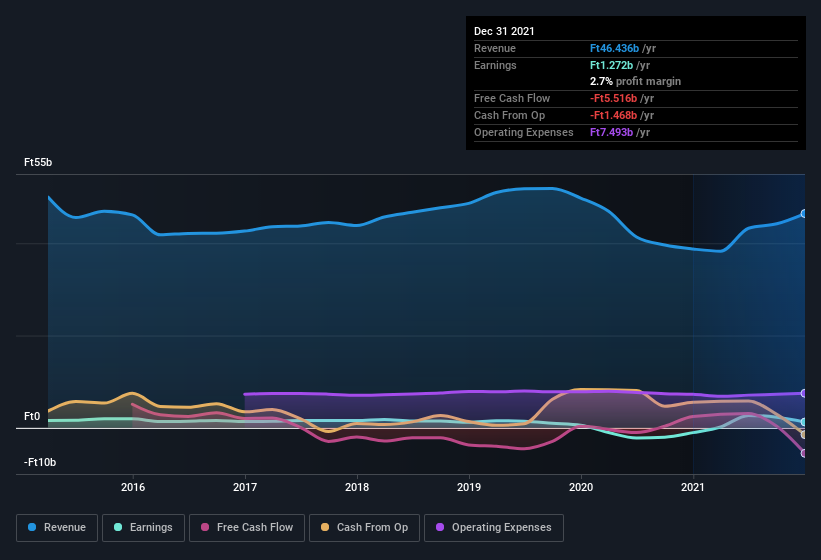Rába Jármûipari Holding Nyrt's (BUSE:RABA) Promising Earnings May Rest On Soft Foundations

Despite posting some strong earnings, the market for Rába Jármûipari Holding Nyrt.'s (BUSE:RABA) stock hasn't moved much. Our analysis suggests that shareholders have noticed something concerning in the numbers.
View our latest analysis for Rába Jármûipari Holding Nyrt

Zooming In On Rába Jármûipari Holding Nyrt's Earnings
One key financial ratio used to measure how well a company converts its profit to free cash flow (FCF) is the accrual ratio. The accrual ratio subtracts the FCF from the profit for a given period, and divides the result by the average operating assets of the company over that time. This ratio tells us how much of a company's profit is not backed by free cashflow.
That means a negative accrual ratio is a good thing, because it shows that the company is bringing in more free cash flow than its profit would suggest. While it's not a problem to have a positive accrual ratio, indicating a certain level of non-cash profits, a high accrual ratio is arguably a bad thing, because it indicates paper profits are not matched by cash flow. That's because some academic studies have suggested that high accruals ratios tend to lead to lower profit or less profit growth.
Rába Jármûipari Holding Nyrt has an accrual ratio of 0.24 for the year to December 2021. Therefore, we know that it's free cashflow was significantly lower than its statutory profit, which is hardly a good thing. Over the last year it actually had negative free cash flow of Ft5.5b, in contrast to the aforementioned profit of Ft1.27b. It's worth noting that Rába Jármûipari Holding Nyrt generated positive FCF of Ft2.4b a year ago, so at least they've done it in the past. The good news for shareholders is that Rába Jármûipari Holding Nyrt's accrual ratio was much better last year, so this year's poor reading might simply be a case of a short term mismatch between profit and FCF. Shareholders should look for improved cashflow relative to profit in the current year, if that is indeed the case.
Note: we always recommend investors check balance sheet strength. Click here to be taken to our balance sheet analysis of Rába Jármûipari Holding Nyrt.
Our Take On Rába Jármûipari Holding Nyrt's Profit Performance
Rába Jármûipari Holding Nyrt didn't convert much of its profit to free cash flow in the last year, which some investors may consider rather suboptimal. Because of this, we think that it may be that Rába Jármûipari Holding Nyrt's statutory profits are better than its underlying earnings power. On the bright side, the company showed enough improvement to book a profit this year, after losing money last year. The goal of this article has been to assess how well we can rely on the statutory earnings to reflect the company's potential, but there is plenty more to consider. Keep in mind, when it comes to analysing a stock it's worth noting the risks involved. Every company has risks, and we've spotted 4 warning signs for Rába Jármûipari Holding Nyrt (of which 3 are a bit unpleasant!) you should know about.
This note has only looked at a single factor that sheds light on the nature of Rába Jármûipari Holding Nyrt's profit. But there are plenty of other ways to inform your opinion of a company. Some people consider a high return on equity to be a good sign of a quality business. So you may wish to see this free collection of companies boasting high return on equity, or this list of stocks that insiders are buying.
New: AI Stock Screener & Alerts
Our new AI Stock Screener scans the market every day to uncover opportunities.
• Dividend Powerhouses (3%+ Yield)
• Undervalued Small Caps with Insider Buying
• High growth Tech and AI Companies
Or build your own from over 50 metrics.
Have feedback on this article? Concerned about the content? Get in touch with us directly. Alternatively, email editorial-team (at) simplywallst.com.
This article by Simply Wall St is general in nature. We provide commentary based on historical data and analyst forecasts only using an unbiased methodology and our articles are not intended to be financial advice. It does not constitute a recommendation to buy or sell any stock, and does not take account of your objectives, or your financial situation. We aim to bring you long-term focused analysis driven by fundamental data. Note that our analysis may not factor in the latest price-sensitive company announcements or qualitative material. Simply Wall St has no position in any stocks mentioned.
About BUSE:RABA
Adequate balance sheet slight.
Market Insights
Community Narratives



